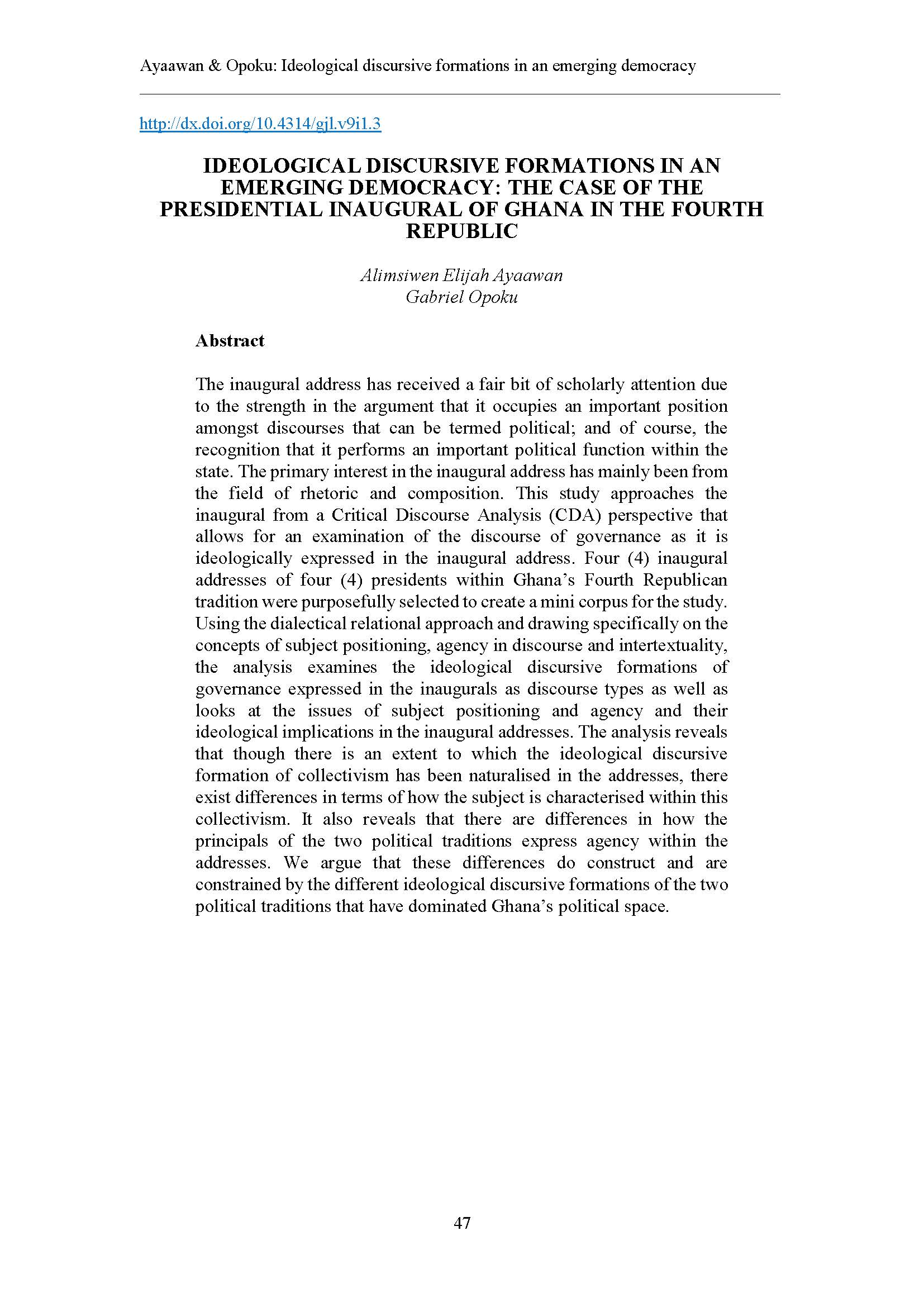Ideological discursive formations in an emerging democracy: The case of the presidential inaugural of Ghana in the Fourth Republic
DOI:
https://doi.org/10.4314/gjl.v9i1.306Keywords:
CDA, inaugural address, transitivity, subject positions, ideology, lexico-grammatical complexityAbstract
The inaugural address has received a fair bit of scholarly attention due to the strength in the argument that it occupies an important position amongst discourses that can be termed political; and of course, the recognition that it performs an important political function within the state. The primary interest in the inaugural address has mainly been from the field of rhetoric and composition. This study approaches the inaugural from a Critical Discourse Analysis (CDA) perspective that allows for an examination of the discourse of governance as it is ideologically expressed in the inaugural address. Four (4) inaugural addresses of four (4) presidents within Ghana’s Fourth Republican tradition were purposefully selected to create a mini corpus for the study. Using the dialectical relational approach and drawing specifically on the concepts of subject positioning, agency in discourse and intertextuality, the analysis examines the ideological discursive formations of governance expressed in the inaugurals as discourse types as well as looks at the issues of subject positioning and agency and their ideological implications in the inaugural addresses. The analysis reveals that though there is an extent to which the ideological discursive formation of collectivism has been naturalised in the addresses, there exist differences in terms of how the subject is characterised within this collectivism. It also reveals that there are differences in how the principals of the two political traditions express agency within the addresses. We argue that these differences do construct and are constrained by the different ideological discursive formations of the two political traditions that have dominated Ghana’s political space.
Keywords: CDA, inaugural address, transitivity, subject positions, ideology, lexico-grammatical complexity
References
Beasley, V. B. (2001). The rhetoric of ideological consensus in the United States: American principles and American pose in presidential inaugurals. Communication Monographs, 68(2), 169–183. https://doi.org/10.1080/03637750128055
Benwell, B., & Stokoe, E. (2006). Discourse and identity. Edinburgh: Edinburgh University Press.
Browne, S. H. (2007). “The Circle of Our Felicities”: Thomas Jefferson’s first inaugural address and the rhetoric of nationhood. Rhetoric & Public Affairs, 5(3), 409–438. https://doi.org/10.1353/rap.2002.0050
Burr, V. (1995). An introduction to social constructionism. London: Routledge.
Campbell, K. K., & Jamieson, K. H. (1985). Inaugurating the presidency. Presidential Studies Quarterly, 15(2), 394–411.
Chung, J. C., & Park, H. W. (2010). Textual analysis of a political message: the inaugural addresses of two Korean presidents. Social Science Information, 49(2), 215–239. https://doi.org/10.1177/0539018409359370
Dickovick, J. T. (2008). Legacies of leftism: Ideology, ethnicity and democracy in Benin, Ghana and Mali. Third World Quarterly, 29(6), 1119–1137. https://doi.org/10.1080/01436590802201089
Ericson, D. F. (1997). Presidential inaugural addresses and American political culture. Presidential Studies Quarterly, 27(4), 727–744.
Fairclough, N. (1992). Discourse and social change. Cambridge: Polity Press.
Fairclough, N. (2013). Critical discourse analysis: The critical study of language. London and New York: Routledge.
Gee, J. P. (2011). An introduction to discourse analysis: Theory and method. New York: Routledge.
Halliday, M.A.K. (1994). An introduction to functional grammar. London: Edward Arnold Publishers.
Halliday, Michael Alexander Kirkwood, & Matthiessen, C. M. I. M. (2004). An introduction to functional gramar. London: Edward Arnold, 3, 1–6.
Ivanič, R. (1998). Writing and identity. The discoursal construction of identity in academic writing. Amsterdam: John Benjamins. https://doi.org/10.1016/S1475-1585(02)00007-3
Liu, F. (2012). Genre Analysis of American Presidential Inaugural Speech. Theory and Practice in Language Studies, 2(11), 2407–2411. https://doi.org/10.4304/tpls.2.11.2407-2411
Morrison, M. K. C. (2004). Political parties in Ghana through Four Republics : A Path to democratic consolidation. Comparative Politics, 36(4), 421–442.
Ninsin, K. A. (2005). Political Parties and Political Participation in Ghana. Political Science, 57(1), 5–20. https://doi.org/10.1177/003231870505700102
Reisigl, M., & Wodak, R. (2001). Discourse and discrimination. Rhetorics of racism and antisemitism. London: Routledge.
van Dijk, T. A. (2007). Ideology anddiscourse: Amultidisciplinary introduction. Retrieved from papers2://publication/uuid/E2ADB45D-683D-41C7-B447-DF745328F34C
Xu, H. (2010). A Study on Conceptual Metaphors in Presidential Inaugural Speeches.

Downloads
Published
How to Cite
Issue
Section
License
Copyright (c) 2020 Ghana Journal of Linguistics

This work is licensed under a Creative Commons Attribution 4.0 International License.
The Ghana Journal of Linguistics is published by the Linguistics Association of Ghana, P. O. Box LG 61, Legon, Accra, Ghana.
LAG Email: linguisticsgh@gmail.com. Website: http://www.laghana.org
GJL Email: gjl@laghana.org Website: http://www.laghana.org/gjl
© Linguistics Association of Ghana and individual authors, 2023.
